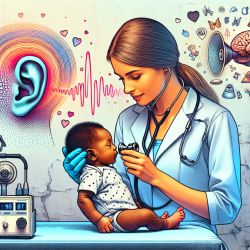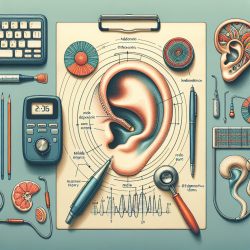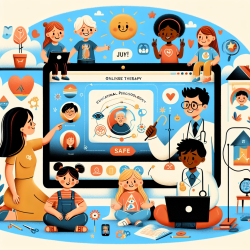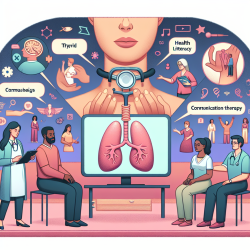Hearing is a fundamental sense that plays a crucial role in the development of language, communication, and social skills in children. Early detection of hearing loss is vital for timely intervention, which can significantly improve the quality of life for affected children. Recent research on screening programs for hearing assessment in newborns and children provides valuable insights for practitioners looking to enhance their skills and knowledge in this area.
The Importance of Early Hearing Assessment
The prevalence of sensorineural hearing loss among newborns is estimated to be about one to three per 1,000 live births. Early detection is essential because undiagnosed hearing loss can lead to delays in speech and language development, social integration issues, and emotional challenges. Therefore, comprehensive screening programs are necessary to identify hearing impairments as early as possible.
Key Findings from Recent Research
A study conducted at the Jinnah Postgraduate Medical Centre and National Institute of Child Health in Karachi, Pakistan, aimed to assess the incidence of hearing loss in newborns using otoacoustic emission (OAE) and brainstem evoked response audiometry (BERA). The study found that out of 108 cases, 12 newborns were identified with hearing loss through OAE screening. Further BERA testing confirmed hearing loss in seven cases.
Screening Techniques
- Otoacoustic Emission (OAE): This non-invasive test evaluates cochlear response to sound stimuli and is effective in identifying sensory or conductive hearing loss.
- Brainstem Evoked Response Audiometry (BERA): This test measures neural activity in response to auditory stimuli and provides a detailed assessment of auditory sensitivity.
Implementing Effective Screening Programs
The study highlights the importance of implementing OAE and BERA screening programs in hospitals to ensure early detection of hearing impairments. Practitioners can improve their skills by familiarizing themselves with these techniques and understanding the significance of early intervention.
Recommendations for Practitioners
- Stay Informed: Regularly attend conferences, webinars, and workshops to stay updated on the latest developments in pediatric audiology.
- Collaborate with Experts: Work closely with audiologists and other healthcare professionals to develop comprehensive screening protocols.
- Educate Parents: Inform parents about the importance of early hearing assessments and encourage them to seek timely evaluations for their children.
- Advocate for Screening Programs: Promote the implementation of universal newborn hearing screening programs within healthcare facilities.
The Path Forward
The findings from this research underscore the need for widespread adoption of neonatal hearing screening programs. By implementing these programs, practitioners can contribute to reducing the impact of hearing impairment on children's developmental outcomes. Furthermore, ongoing research and collaboration among healthcare providers will continue to enhance the effectiveness of these screening initiatives.
To read the original research paper, please follow this link: Screening Programs for Hearing Assessment in Newborns and Children.










